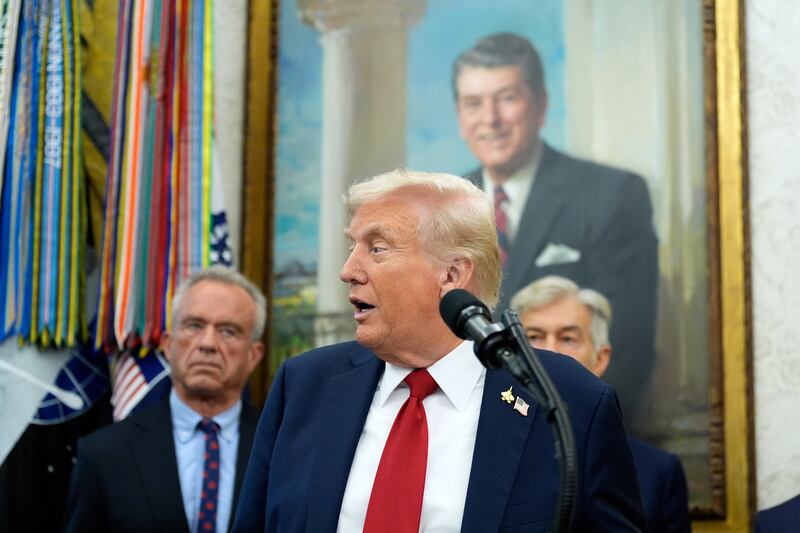WASHINGTON (AP) — Drugmaker Pfizer has agreed to lower drug costs and invest $70 billion in U.S. manufacturing under a deal struck with the Trump administration, President Donald Trump said Tuesday.
The announcement, which Trump made with Pfizer CEO Albert Bourla at the White House, came as the Republican president has for months sought to lower drug costs.
Under the agreement, New York-based Pfizer will charge most-favored-nation pricing to Medicaid and guarantee that pricing on newly launched drugs, Trump said. That involves matching the lowest price offered in other developed nations.
“It’s going to have a huge impact on bringing Medicaid costs down like nothing else,” the president said.
“I can’t tell you how big this is,” he added.
It’s unclear how the new policy will affect Medicaid patients who often pay a nominal co-payment of a few dollars to fill their prescriptions, but lower prices could help state budgets that fund the programs. Medicaid is the state and federally funded program for people with low incomes.
Besides committing to lowering costs, Trump said, Pfizer agreed to spend $70 billion in domestic manufacturing facilities. The White House did not immediately release details about the investment.
Pfizer Inc. is one of the largest U.S. drugmakers. It produces the COVID-19 vaccine Comirnaty and the treatment Paxlovid. Its products also include several cancer drugs, the blood thinner Eliquis and the pneumonia vaccine Prevnar.
Trump has been talking for months about the need to lower drug prices. He issued an executive order in May giving drugmakers 30 days to electively lower prices or face new limits on what the government will pay.
He then sent letters in late July to executives at 17 pharmaceutical companies about changes he would like to see. Copies of the letters posted on social media note that U.S. prices for brand-name drugs can be up to three times higher than averages elsewhere.
The letters called for drugmakers to commit by Monday to offering what Pfizer agreed to: most-favored-nation pricing to Medicaid and new medications.
Trump also asked drugmakers to offer the lower pricing levels for drugs sold directly to consumers and businesses.
Health and Human Services Secretary Robert F. Kennedy Jr., who joined Trump, Bourla and others at the White House, applauded the president as he touted the deal.
“Americans should not be gouged paying 300 or 400 or 1,000% more than people in other countries for the exact same drug,” he said.
Trump has claimed that the U.S., with its higher drug prices, subsidizes care in other countries.
On Thursday, Trump announced a move that could raise future drug prices: 100% import taxes on branded drugs starting Wednesday. Those tariffs would not apply to companies building U.S. manufacturing plants or to generic medications.
Drugmakers in the past couple of years have started launching websites to connect customers directly with some products like Lilly’s obesity treatment Zepbound or the blood thinner Eliquis from Pfizer and Bristol-Myers Squibb. That comes as patients have grown more comfortable with receiving care virtually after the practice exploded in popularity during the coronavirus pandemic.
